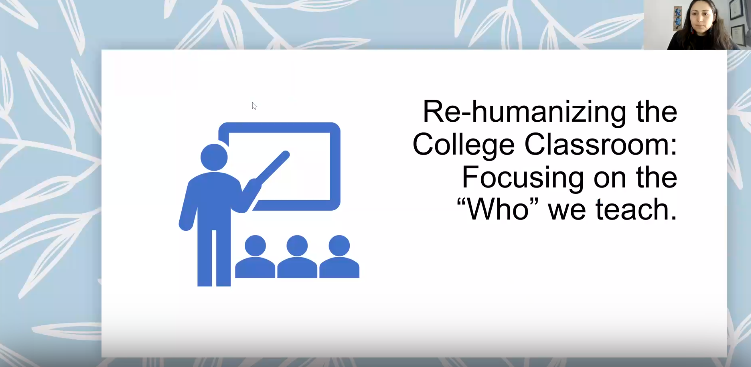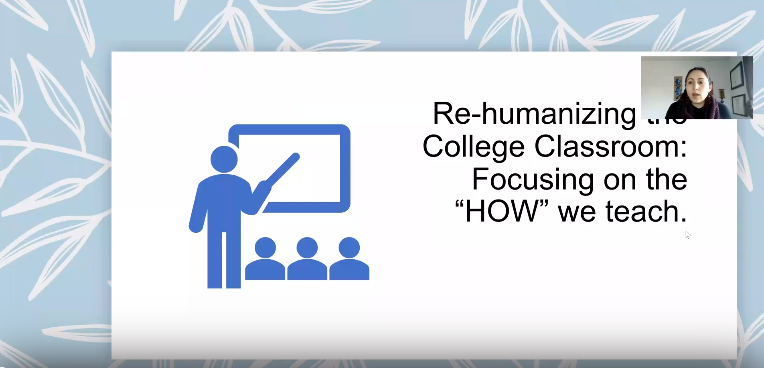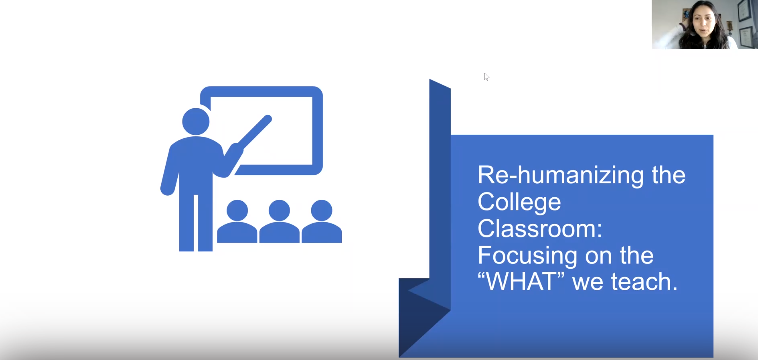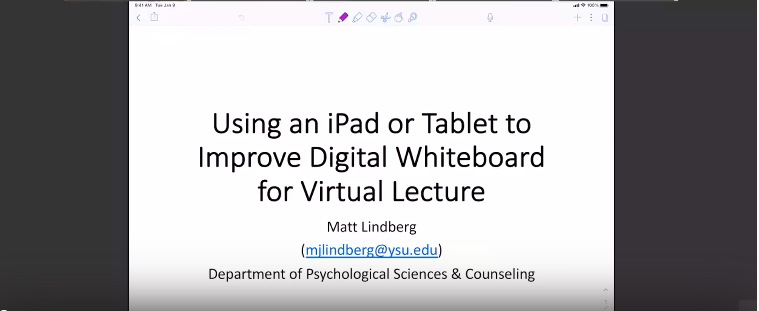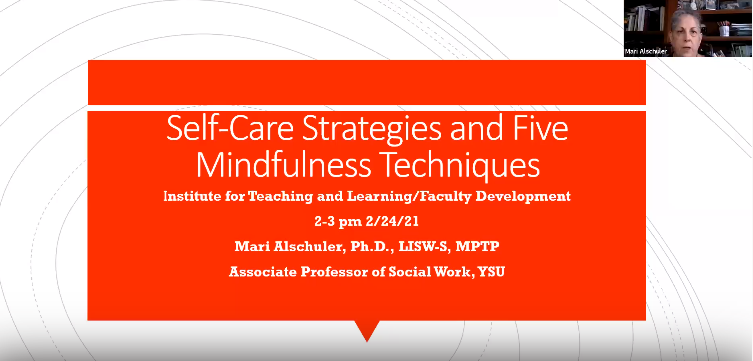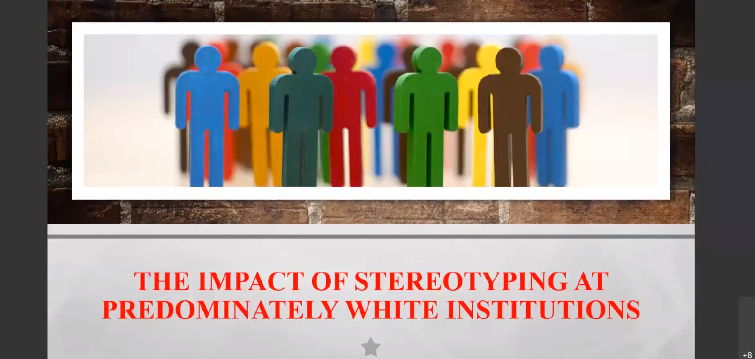Clone of Past Workshops & Materials
Past Workshops
Some workshop materials are available in a OneDrive folder, you will be asked to sign in with your YSU ID and password to access the materials.
PLEASE REACH OUT TO AN ITL STAFF MEMBER WITH QUESTIONS OR CONCERNS
- Managing Classroom Conversations Panel Series
THURSDAY, SEPTEMBER 30TH 3-4PM
In this ITL panel discussion series, we will explore how faculty in different disciplines approach, address, and manage civil conversations around challenging topics.
This panel will focus on how faculty are maintaining civil conversations, supporting fearful students, and having productive conversations. This session starts from the place that the university encourages vaccines and is not intended as a vaccine debate.
Panelists include:
Recording Coming Soon
Nicolette Powe, Public Health
Alan Tomhave, Philosophy
Nicole Kent-Strollo, Dean of Students - Telling Fact from Fiction - Information Literacy with Students with Faculty Fellow Monica Merrill
THURSDAY, OCTOBER 7TH 3-4PM
In this workshop we will go over strategies to help students differentiate fact from fiction. We will go over activities that students can do to help them learn this skill. We will explore ways to incorporate these lessons into existing classroom activities and assignments. Lastly, we will discuss how we can emphasize the importance of learning how to tell fact from fiction to students.
Participants will be asked to pick an existing assignment in their class and think about how they could add differentiating fact from fiction as a learning outcome for that assignment.
View Slides - ITl Lunch & Learn: Grading for Equity
THURSDAY, OCTOBER 14TH 12-1PM
Join ITL staff to discuss strategies for equitable assignment and assessment design. The workshop will focus in 3 areas - maintaining high expectations, a willingness to challenge the way “we’ve always done it,” and increasing transparency by involving students. We will share ready to go examples that we’ve tested in our courses and are ready to use in yours!
Recording Coming Soon - Managing Classroom Conversations Panel Series: De-Escalading Tension in the Classroom
TUESDAY, OCTOBER 19TH 3-4PM
In this ITL panel discussion series, we will explore how faculty in different disciplines approach, address, and manage civil conversations around challenging topics.
This panel will focus on how to help students who may be frustrated, angry, or upset, both in the classroom or in individual interactions. The focus will be on creating a positive classroom community.
Recording Coming Soon - Classroom Management in Divided Times with Faculty Fellow Monica Merrill
TUESDAY, OCTOBER 26TH 1-2PM
In this workshop, we will discuss the four typical reactions that students have to difficult/contentious topics (paralysis, paralysis by proxy, rage, and resistance). We will explain each and participants will be asked to identify examples that they have seen in their classes. Lastly, we will go over best practices for classroom management strategies and how we can potentially apply them to our courses.
Participants will be asked to choose a class they are teaching and to identify possible polarizing topics and best practices. They will then work together to pair some of the classroom management strategies we have gone over to each of their topics.
View Slides - Reviving Your Intellectual Life
WEDNESDAY, NOVEMBER 3RD 3-4PM
I don't know about you, but after a tough year, I can sure use a jump-start. This workshop will offer a variety of resources and opportunities to re-engage with your research agenda. Learn about grant opportunities, new research databases, podcast and article clubs, and writing circles. Get inspired!
Recording Coming Soon - Designing a Course with Contention in Mind with Faculty Fellow Monica Merrill
THURSDAY, DECEMBER 2ND 3-4PM
In this workshop, we will review the four typical reactions that students have to difficult/contentious topics (paralysis, paralysis by proxy, rage, and resistance). After we identify and explain the four reactions, we will discuss what examples of this participants have seen in their classroom and what ‘triggers’ they see in the course structure. Lastly, we will discuss ways we can proactively manage these reactions by how we structure our courses.
Participants will be asked to choose one course they teach and brainstorm ways that they can be proactive about these reactions and what they can do to lessen them.
Recording Coming Soon - Curricular Complexity for Curricular Efficiency
28-SEP-21
Summer 2021
spring 2021
- Flower Darby: Effective Teaching Strategies for Teaching Online & Hybrid During COVID- 19
- Small Teaching Online: Practical Strategies for Teaching During COVID-19 (9a- 10a)
- Fostering Connections to Help Online Students Engage and Learn (10:10a- 10:35a)
- Teaching Inclusive and Equitable Online and Remote Courses (11a-11:25a)
- Assessments That Promote Academic Integrity in Virtual Environments (11:35a- 12p)
- Part-Time Faculty Session: Setting Yourself Up for Success -- How to Have an Organized & Efficient Semester
- Solid Start, Solid Middle, Solid Finish: Tips & Strategies to Help Your Online Learners (and you) Successfully Manage the Virtual Learning Environment
- Student Panel: What I Wish My Professor Knew
- Burnout Resilience in Challenging Times
- Re-Humanizing the College Classroom: Focusing on the "Who" we Teach
Thursday, February 18th, 3-4P Facilitator: Alicia Prieto. In this workshop we discussed who our students are and how to center their humanity in our classrooms. We spoke about the so-called “classic” modes of instruction and who they benefit and who they leave behind. We explored how belonging affects learning and how to create spaces conductive to the discovery and creation of knowledge in our classrooms.
Click the recording below to view.
Image - Re-Humanizing the College Classroom: Focusing on the "How" we Teach
Thursday, March 4th, 3-4P Facilitator: Alicia Prieto. In this workshop we discussed particular ways to bring humanity into the classroom. We talked about ways to build community, different examples of active learning, and ways in which we can facilitate students ownership of their own learning
Click the recording below to view.
Image - Re-Humanizing the College Classroom: Focusing on the "What" we Teach
Thursday, March 18th, 3-4P Facilitator: Alicia Prieto. In this workshop we re-evaluated what we are teaching by focusing on what skills and knowledge we are expecting college graduates to have. We discussed ways in which we can design curriculum around who our students are and different ways of assessing students’ growth.
Click the recording below to view.
Image
- Efficient Outline Course Design
Tuesday, January 26th, 4-5P Facilitator: Mark Vopat. This workshop outlined the steps necessary to create an effective online course. It was geared toward those that have little to no experience with creating online courses. Topics to be discussed include:
No Recording Available
1. Backward Course Design
2. General course/module structure
3. Media
4. Course preparation workflows
5. Instructor presence
6. Facilitation - Using an IPad or Tablet to Improve Digital Whiteboards for Virtual Lecture
Thursday, February 4th, 3-5P Facilitator: Matt Lindberg. This workshop discussed you how to incorporate the writing ability of an iPad or tablet into your lectures. The workshop was presented using an iPad and Mac, but options and alternatives were discussed.
Click the recording below to view.
Image
- Mindfulness Techniques for Self-Care
Wednesday, February 24th, 2-3P Facilitator: Mari Alschuler, Ph.D., LISW-S. In this workshop, participants discussed five basic mindfulness techniques they can use at any time for stress management. Participants also explored self-care strategies by completing an exercise and then discussed how they intend to implement their self-care plan.
Click the recording below to view.
Image
- An Introduction to Open Educational Resources
Wednesday, March 10th, 4-5P Facilitator: Shelley Blundell. This workshop provided participants with a practical overview of Open Educational Resources (OERs) and their use in higher education, particularly in courses with high-cost textbooks, which YSU students frequently do not purchase because of these high costs. Examples of the workshop instructor’s own OER usage, their overall benefits to students, and resources for finding high-quality OERs participants were shared with attendees.
No Recording Available - The Impact of Sterotyping at Predominately White Institutions
- Tired of Virtual Meetings?
Anybody else ready to be able to meet again in person? I sure am! Unfortunately, we're looking at another semester of having to connect and engage remotely. Watch this pre-recorded session that runs through a whole bunch of ideas that will hopefully make your meetings a little less boring. Nothing replaces the real thing, but I hope you find something that is useful to your student organization.
- Creating an Asynchronous Course
28-JAN-21
- SGA: Assessing Diversity, Equity & Inclusion
6-FEB-21
- Pandemic Grading -- New Ways of Grading for COVID-19 and beyond
"Pandemic Grading—New ways of grading for COVID-19 and beyond" facilitated by Dr. Marsha Huber, Professor of Accounting
This workshop will introduce you to two new grading methods – (1) competency-based grading and (2) specifications grading. Like you, the pandemic forced me to rethink how I was grading student work. I adopted “competency-based” grading where grades are based on whether students meet competencies instead of focusing on averaging points. Also, I intuitively began grading my graduate students' work differently than in prior semesters, which I have since learned is called “specifications grading.” In the workshop, I will share what I did and how students reacted to it, allowing time for you to workshop your classes too.
- Teaching Distracted Minds: Old Challenges, New Contexts facilitated by James Lang, Professor of English and the Director of the D'Amour Center for Teaching Excellence at Assumption University
Faculty concerns about distracted students have intensified as we have all shifted online, but our real focus should be on how we help students achieve attention. This session draws upon scholarship from history, neuroscience, and education in order to argue that distractions are endemic to the human condition, and can’t be walled out of the physical classroom or online course. Instead, we should focus on creating educational experiences that cultivate and sustain attention. Participants will learn about a variety of potential pathways to developing such experiences for their students.
About James Lang:
James M. Lang is a Professor of English and the Director of the D’Amour Center for Teaching Excellence at Assumption University in Worcester, MA. He is the author of six books, the most recent of which are Distracted: Why Students Can’t Focus and What You Can Do About It (Basic Books, 2020), Small Teaching: Everyday Lessons from the Science of Learning (Jossey-Bass, 2016) and Cheating Lessons: Learning from Academic Dishonesty (Harvard University Press, 2013), and On Course: A Week-by-Week Guide to Your First Semester of College Teaching (Harvard UP, 2008).
Jim writes a monthly column on teaching and learning for The Chronicle of Higher Education; his work has been appearing in the Chronicle since 1999. His book reviews and public scholarship on higher education have appeared in a wide variety of newspapers and magazines, including the Boston Globe, Chicago Tribune, and Time. He edits a series of books on teaching and learning in higher education for West Virginia University Press. Learn more at jamesmlang.com
Fall 2020
- You're on Mute: How to Make Your Digital Meetings Fun & Meaningful
Learn about some low-effort strategies and free tools that you can include in your virtual student organization meetings to increase interaction, keep members engaged, and give everyone a voice!
- Managerial Communication
4-SEP-20
- LinkedIn Learning Demo
13-OCT-20
- Corrective Action
16-OCT-20
- Building Your Home- Based Streaming Classroom
29-OCT-20
- Student Learning during COVID
5-NOV-20
- Virtual Connections Webinar (Impact Solutions)
12-NOV-20
- Safe Return to the Classroom with COVID
Members of the "Calendar Scenarios for a Safe YSU" Taskforce, will share key information and prepare you to return to your classrooms this fall. Provost Smith will also lead a Q&A session after the presentation. Topics include the "For Pete's Sake" safety campaign information, syllabus statements, attendance tracking, and face-covering policies. Download supplemental slides on collecting attendance using the YSU App for contract tracing.
- Tips & Tools to Working Digitally
This training is a survey workshop of multiple available tools and platforms and best practices for successfully working remotely or additional ways to use these tools while working on campus.
Summer 2020
- Getting Started
This workshop is a survey of the best practices and university supported tools that will enable to you set the expectations for your course, ensure your course is equitable, communicate with your students, and provide information on resources for students that need assistance with using class technologies.
- Instructional Basics
This survey workshop moves beyond Getting Started and provides best practices and tools, depending on the modality, suggests ways you can distribute course material, assess student learning, maintain academic integrity and host live lectures.
- Instructional Advanced
This workshop will provide ideas, resources, and ways for students to demonstrate a skill, give an online presentation, encourage their learning and facilitate a lab remotely.
- Engaging Students
As you continue to build your course it is important that you provide ways for students to engage in the learning process. This workshop will provide ideas and ways to personalize your course, help your students engage with the content and help them participate in a class discussion. The workshop will also provide tools and best practices for hosting and managing a simultaneous face-to-face and online audience.
- Supporting Success
It is important that students stay involved in the course. This workshop will provide you with various ways to check student understanding of content, provide them quality feedback, ideas to help keep them motivated and involved in the course.
- Connecting Students
Retention studies show that one of the major components of retaining students is that they feel supported, connected to campus and connected to each other. This workshop will provide information how students can work on group projects together successfully, ways they can connect with each other and you and the campus support resources available to them in the areas of academic support, physical and mental health support, and how to assist a student in distress.
- Blended Course Design
Participants will learn a backward design approach and instructional strategies that will help faculty planning new fall modalities, or as a backup plan for traditional courses.
spring 2020
- Get Ready: Blackboard Ultra is Here!
9-JAN-20
- Teaching Toward Student Success
9-JAN-20
- Things You Didn't Know You Could Do in Office 365 Education
9-JAN-20
- NL Data Converdation: Advising, Instruction, Academic Services
5-FEB-20
- NL Data Conversation: Admissions/Recruitment, Financial Aid & Registration
19-FEB-20
- Emergency Management in Study Abroad Trips
25-FEB-20
- NL Data Conversation: Student Centeredness, Campus Climate, Climate Life, Safety/Security
4-MAR-20
- Supporting Student Mental Health Remotely
Find out how faculty and staff can support students' mental health needs during online instruction. You will learn the value of asking, listening, acknowledging, supporting, challenging, and connecting. We will discuss your role and scope of care as an educator and learn about additional resources to you and your students. Webinar delivered by Dr. Ann Jaronski, Director of YSU Student Counseling Services.
- Academic Student Support for Remote Learning
We know that some of your students may be struggling academically right now, and that you want to help them. Becky Varian, Center for Student Progress Director, will present ways we can support students, and what resources are available to help.
Online Course Reassessment Student Handout
Final 4 Weeks Planning Calendar Student Handout
Top 10 Online Learning Strategies - Student Handout
- Online Speeches? Yes, It Can Work!
Online speeches work best with careful planning and preparation. In this hour-long webinar, Cary Wecht and Dorian Mermer (Department of Communication) walk you through the steps to set up your assignment and assessments to maximize speech quality.
fall 2019
- Community Engaged Pedagogies
24-SEP-19
- Establishing the Learning Center as the Nucleus of a Learner Centered Insitution
14-OCT-19
- Get Students to Focus on Learning Instead of Grades: Metacognition is Key!
14-OCT-19
- Teach Students How to Learn 2.0
14-OCT-19
- Using Appreciative Advising to Help Students Excel
14-OCT-19
- Tenure and Promotion
24-OCT-19
- Inclusion and Interaction Webinar
7-NOV-19
- Persons of Concern
13-NOV-19
- Getting Non-Science Majors Excited about Science!
15-NOV-19
- Flipping Classrooms via Actice Learning Techniques
22-NOV-19

